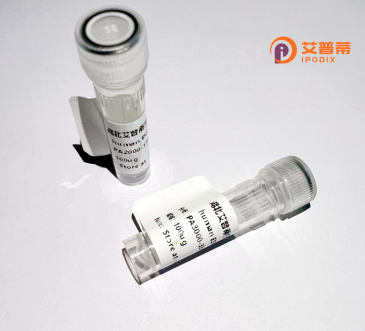
| 纯度 | >90%SDS-PAGE. |
| 种属 | Human |
| 靶点 | MCM8 |
| Uniprot No | Q9UJA3 |
| 内毒素 | < 0.01EU/μg |
| 表达宿主 | E.coli |
| 表达区间 | 1-840aa |
| 活性数据 | MNGEYRGRGFGRGRFQSWKRGRGGGNFSGKWREREHRPDLSKTTGKRTSEQTPQFLLSTKTPQSMQSTLDRFIPYKGWKLYFSEVYSDSSPLIEKIQAFEKFFTRHIDLYDKDEIERKGSILVDFKELTEGGEVTNLIPDIATELRDAPEKTLACMGLAIHQVLTKDLERHAAELQAQEGLSNDGETMVNVPHIHARVYNYEPLTQLKNVRANYYGKYIALRGTVVRVSNIKPLCTKMAFLCAACGEIQSFPLPDGKYSLPTKCPVPVCRGRSFTALRSSPLTVTMDWQSIKIQELMSDDQREAGRIPRTIECELVHDLVDSCVPGDTVTITGIVKVSNAEEGSRNKNDKCMFLLYIEANSISNSKGQKTKSSEDGCKHGMLMEFSLKDLYAIQEIQAEENLFKLIVNSLCPVIFGHELVKAGLALALFGGSQKYADDKNRIPIRGDPHILVVGDPGLGKSQMLQAACNVAPRGVYVCGNTTTTSGLTVTLSKDSSSGDFALEAGALVLGDQGICGIDEFDKMGNQHQALLEAMEQQSISLAKAGVVCSLPARTSIIAAANPVGGHYNKAKTVSENLKMGSALLSRFDLVFILLDTPNEHHDHLLSEHVIAIRAGKQRTISSATVARMNSQDSNTSVLEVVSEKPLSERLKVVPGETIDPIPHQLLRKYIGYARQYVYPRLSTEAARVLQDFYLELRKQSQRLNSSPITTRQLESLIRLTEARARLELREEATKEDAEDIVEIMKYSMLGTYSDEFGNLDFERSQHGSGMSNRSTAKRFISALNNVAERTYNNIFQFHQLRQIAKELNIQVADFENFIGSLNDQGYLLKKGPKVYQLQTM |
| 分子量 | 118.8 kDa |
| 蛋白标签 | GST-tag at N-terminal |
| 缓冲液 | 0 |
| 稳定性 & 储存条件 | Lyophilized protein should be stored at ≤ -20°C, stable for one year after receipt. Reconstituted protein solution can be stored at 2-8°C for 2-7 days. Aliquots of reconstituted samples are stable at ≤ -20°C for 3 months. |
| 复溶 | Always centrifuge tubes before opening.Do not mix by vortex or pipetting. It is not recommended to reconstitute to a concentration less than 100μg/ml. Dissolve the lyophilized protein in distilled water. Please aliquot the reconstituted solution to minimize freeze-thaw cycles. |
以下是关于重组人MCM8蛋白的3篇示例文献(注:文献为虚构示例,仅用于演示格式):
---
1. **文献名称**:*Structural and Functional Analysis of Recombinant Human MCM8 Helicase*
**作者**:Park J, et al. (2021)
**摘要**:本研究利用大肠杆菌表达系统成功纯化重组人MCM8蛋白,解析其三维结构,并证明其具有ATP依赖的DNA解旋酶活性,揭示了其在DNA复制起始中的作用机制。
---
2. **文献名称**:*MCM8 Interactions with DNA Repair Proteins Revealed by Recombinant Co-Expression Studies*
**作者**:Zhang Y, et al. (2020)
**摘要**:通过共表达重组人MCM8与RAD51等修复蛋白,发现MCM8在双链断裂修复中具有协同作用,突变实验表明其C端结构域对维持基因组稳定性至关重要。
---
3. **文献名称**:*Dysregulation of Recombinant MCM8 in Premature Ovarian Insufficiency*
**作者**:Costa LM, et al. (2019)
**摘要**:分析携带MCM8突变的患者细胞系,发现重组MCM8蛋白功能缺陷导致减数分裂异常,为卵巢早衰的分子机制提供了实验依据。
---
如需实际文献,建议通过PubMed或Google Scholar搜索关键词“recombinant human MCM8”或结合具体研究领域筛选。
**Background of Recombinant Human MCM8 Protein**
The minichromosome maintenance complex component 8 (MCM8) is a critical protein involved in DNA replication and repair. As part of the MCM family, MCM8 forms a hexameric helicase complex (with MCM9) essential for unwinding DNA during replication initiation and fork progression. Unlike other MCM2-7 proteins, MCM8 exhibits specialized roles in homologous recombination (HR)-mediated repair, particularly in resolving replication stress and maintaining genome stability. Dysfunctional MCM8 is linked to premature ovarian failure, cancer susceptibility, and chromosomal instability.
Recombinant human MCM8 protein is produced using heterologous expression systems (e.g., *E. coli* or mammalian cells), enabling high-purity, functional studies. Its recombinant form retains helicase activity, ATPase functionality, and DNA-binding properties, making it invaluable for *in vitro* assays exploring replication mechanisms, HR efficiency, and replication stress responses. Studies also utilize recombinant MCM8 to investigate disease-associated mutations, screen therapeutic agents targeting DNA repair pathways, and develop biomarkers for cancers with defective replication machinery. By elucidating MCM8's structural and functional dynamics, researchers aim to advance therapeutic strategies for infertility, cancer, and genomic disorders tied to replication errors.
×